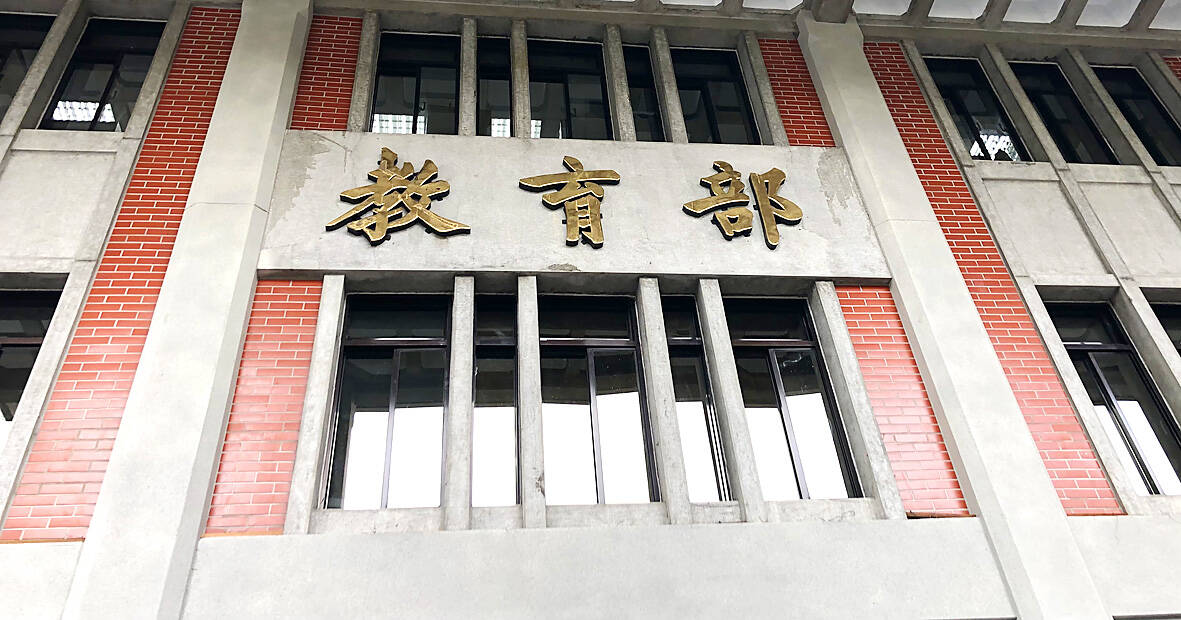Thirteen private high schools and vocational high schools on the Ministry of Education’s “Extraordinary Assistance List” could close next year if they fail to resolve their troubled operations, affecting about 2,503 students and 331 staff.
The schools have until May next year to improve operations or be forced to close before Aug. 1 that year, K-12 Education Administration manager Huang Ching-yi (黃黃儀) said.
Long Der Commercial and Household Vocational High School dean Hsu Yung-fang (徐詠芳) said it is the only vocational school south of the Jhonggang River (中港溪) in Miaoli County, adding that it has been seeking to establish courses for immigrants and has already filed to be removed from the list.

Photo: Rachel Lin, Taipei Times
Hung Jen Catholic Girls’ High School dean Hsu Yao-wen (許耀文) said the board of the Chiayi County school had approved an injection of NT$80 million (US$2.5 million).
It has shifted toward a focus on robotics in the past few years, Hsu said, adding that after the K-12 Educational Administration’s second visit next month, it would remove the school from the list.
Kung Tung St Joseph Technical Senior High School dean Lee Jung-kung (李榮恭) said the Taitung County school had been placed on the list due to a financial setback.
Lee said he was confident the school would overcome the financial issue as it is in the process of liquidating real-estate assets.
Former K-12 Education Administration director Wu Ching-shan (吳清山) yesterday said the effects of a declining birthrate are spreading from universities to high schools, adding that this was an urgent matter that president-elect William Lai (賴清德) must address after taking office in May.
While the issue poses a challenge, it is also an opportunity to fine-tune the nation’s education policies and launch a comprehensive reassessment of schools and local needs, Wu said.
He said that special subsidies could help local government keep one to three private vocational schools to help students in their communities.
National Federation of Teachers’ Unions president Hou Chun-liang (侯俊良) said the school closures show that education policies, such as allowing the establishment of multiple high schools and colleges in an area, require review.
Action Alliance on Basic Education chairman Wang Han-yang (王瀚陽) urged Lai to review the number of schools in the nation and assess local needs, adding that the government should not sit by and watch as private schools close.
Government intervention is necessary if the closure of schools would affect students and require them to commute to continue their studies, National Parent Education Volunteer Association president Hsu Chu-lung (徐巨龍) said.
Additional reporting by Peng Chien-li, Wang Shan-yen, and Huang Ming-tang

Chinese Nationalist Party (KMT) Chairman Eric Chu (朱立倫), spokeswoman Yang Chih-yu (楊智伃) and Legislator Hsieh Lung-chieh (謝龍介) would be summoned by police for questioning for leading an illegal assembly on Thursday evening last week, Minister of the Interior Liu Shyh-fang (劉世芳) said today. The three KMT officials led an assembly outside the Taipei City Prosecutors’ Office, a restricted area where public assembly is not allowed, protesting the questioning of several KMT staff and searches of KMT headquarters and offices in a recall petition forgery case. Chu, Yang and Hsieh are all suspected of contravening the Assembly and Parade Act (集會遊行法) by holding

PRAISE: Japanese visitor Takashi Kubota said the Taiwanese temple architecture images showcased in the AI Art Gallery were the most impressive displays he saw Taiwan does not have an official pavilion at the World Expo in Osaka, Japan, because of its diplomatic predicament, but the government-backed Tech World pavilion is drawing interest with its unique recreations of works by Taiwanese artists. The pavilion features an artificial intelligence (AI)-based art gallery showcasing works of famous Taiwanese artists from the Japanese colonial period using innovative technologies. Among its main simulated displays are Eastern gouache paintings by Chen Chin (陳進), Lin Yu-shan (林玉山) and Kuo Hsueh-hu (郭雪湖), who were the three young Taiwanese painters selected for the East Asian Painting exhibition in 1927. Gouache is a water-based

Taiwan would welcome the return of Honduras as a diplomatic ally if its next president decides to make such a move, Minister of Foreign Affairs Lin Chia-lung (林佳龍) said yesterday. “Of course, we would welcome Honduras if they want to restore diplomatic ties with Taiwan after their elections,” Lin said at a meeting of the legislature’s Foreign Affairs and National Defense Committee, when asked to comment on statements made by two of the three Honduran presidential candidates during the presidential campaign in the Central American country. Taiwan is paying close attention to the region as a whole in the wake of a

OFF-TARGET: More than 30,000 participants were expected to take part in the Games next month, but only 6,550 foreign and 19,400 Taiwanese athletes have registered Taipei city councilors yesterday blasted the organizers of next month’s World Masters Games over sudden timetable and venue changes, which they said have caused thousands of participants to back out of the international sporting event, among other organizational issues. They also cited visa delays and political interference by China as reasons many foreign athletes are requesting refunds for the event, to be held from May 17 to 30. Jointly organized by the Taipei and New Taipei City governments, the games have been rocked by numerous controversies since preparations began in 2020. Taipei City Councilor Lin Yen-feng (林延鳳) said yesterday that new measures by